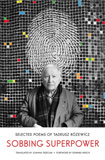June 20, 2012SOBBING SUPERPOWER: SELECTED POEMS BY TADEUSZ ROZEWICZ
Review by Adam Palumbo
WW Norton & Company
500 Fifth Avenue
New York, NY 10110
2011, 364 pp., $32.95
ISBN 978-0-393-06779-8
www.wwnorton.com
The publication of translated texts in the United States makes up roughly three percent of the market in a given year, with the translation of poetry only accounting for a fraction of this tiny percentage. Perhaps the most overlooked work translated into English in the U.S. this year is Tadeusz Rozewicz’s Sobbing Superpower, given to us out of the Polish by Joanna Trzeciak. The collection contains poems from across a period of more than sixty years, from Rozewicz’s debut in 1947 to a previously unpublished poem written in 2010. With a style that is at once idiosyncratic and accessible, Rozewicz’s poetry explores his extraordinary personal grief as well as painful global issues.
A prolific and gifted poet, playwright, and essayist, Tadeusz Rozewicz was born in Radomsko, Poland in 1921 and came of age during World War II, a conflict that he witnessed tear apart both his homeland and his family. His brother Janusz was murdered by the Gestapo and he, along with his surviving brother Stanislaw, hid the fact from his parents until the end of the war. The personal price that Rozewicz paid during the war manifests in his poetry afterward. His first two collections of poetry, Anxiety (published in 1947) and Red Glove (1948), contain all the vitriol and pessimism that define his career.
And yet, out of the ruins of World War II in Poland came the most astounding generation of poets the country had ever seen–Szymborska, Milosz, Herbert, among others. Undoubtedly, Rozewicz has earned his place among these distinguished names. With a style that operates on multiple different levels, from sardonic to surreal, from tragic to polemic, Rozewicz’s poems explore the many-sided nature of human experience with a pinpoint intelligence.
Of course, like poetry out of any war, Rozewicz’s poetry is preoccupied with the morbid side of human nature. The poet’s signature stark line highlights an innately cynical view toward the nature of man. No poem more perfectly evokes the calamity of Rozewiz’s personal experiences during the Holocaust than “Survivor,” published as a part of his debut book Anxiety. He writes,
I’m twenty-four
Led to slaughter
I survived…
Man is killed just like an animal
I’ve seen:
truckloads of chopped-up people
who will never be saved.Concepts are only words:
virtue and vice
truth and lie
beauty and ugliness
courage and cowardice.
Tortured by his witness of human depravity, Rozewicz uses his cunningly simple verse to cut gashes into the psyche of his reader. Although published in the poet’s later career, in 1998, “Unde malum?” is a poem that revisits his negative view of human nature in a similar style:
Where does evil come from?
what do you mean “where”from a human being
always a human being
and only a human beinga human being is a work-related
accident
of nature
an error
Rozewicz cannot ignore the horrific experience he had at the hands of Nazi Germany. Yet like his contemporaneous Polish bards, he has found a way to witness and memorialize with his poetry. He recognizes the transience of his own words, saying in “stick on water”: “I write as if on water.” However, he seeks to keep alive the memory of his friend Jerzy Nowosielski’s dead wife Zosia, the subject of the poem who is named in the epigraph, and in doing so demonstrates the regenerative power of poetry.
Rozewicz does this frequently throughout Sobbing Superpower, alluding to other significant artists in his life that have provided him with solace or with inspiration. Other poets, scholars, dramatists, painters, philosophers, or architects are all fair game, Polish or not. Perhaps the most recognizable of these influences is Ezra Pound, a figure that Rozewicz brings up in numerous works. It is easy to see the connection between the two men: both men were victims of governmental forces, and much of Rozewicz’s cynicism is owed to Pound. But Rozewicz rejects the prevailing opinion of Pound and revisits the controversial figure in an almost endearing way. This is exactly what Edward Hirsch referred to when in the preface he describes Rozewicz as a “poet of dark refusal…a stubborn outsider.”
Rozewicz’s abilities as a poet are not in question, though. His style is sparse and abrupt, but his tropes and metaphors are haunting and sudden, and so his form is simply following his content. Perhaps the most striking poem of the entire collection is “The Professor’s Knife,” the title poem of Rozewicz’s 2001 book. It is a haunting six-part poem that centers on the objects he sees that remind him of the tragedy of the Holocaust, in particular the knife his friend Mieczyslaw Porebski keeps on his desk from his time in a concentration camp. The image of a departing train also evokes a response from the poet:
the trains started moving
freight trains and cattle trains
loaded with banal evil
started to move from east
west
south and northfreight cars
loaded with banal fear
banal depairto this very day banal tears
roll down
the faces of old women
after the war miraculous paintings wept
and living women
weptsculptures wept people wept
These physical objects, through Rozewicz’s seemingly casual verse, take on astounding emotional weight. His words speak through things, the way only a witness can.